Four Seminars
Studies in Continental Thought
GENERAL EDITOR
JOHN SALLIS
CONSULTING EDITORS
Robert Bernasconi | William L. McBride |
Rudolf Bernet | J. N. Mohanty |
John D. Caputo | Mary Rawlinson |
David Carr | Tom Rockmore |
Edward S. Casey | Calvin O. Schrag |
Hubert L. Dreyfus | Reiner Schrmann |
Don Ihde | Charles E. Scott |
David Farrell Krell | Thomas Sheehan |
Lenore Langsdorf | Robert Sokolowski |
Alphonso Lingis | Bruce W. Wilshire |
David Wood
Martin Heidegger
Four Seminars
Le Thor 1966, 1968, 1969, Zhringen 1973
Translated by
Andrew Mitchell and Franois Raffoul

This book is a publication of
Indiana University Press
601 North Morton Street
Bloomington, Indiana 47404-3797 USA
iupress.indiana.edu
Telephone orders 800-842-6796
Fax orders 812-855-7931
First published in German as
Vier Seminare. Le Thor 1966, 1968, 1969 Zhringen 1973,
edited by Curd Ochwadt.
Frankfurt am Main: Vittorio Klostermann, 1977.
Also published in German in Martin Heidegger,
Gesamtausgabe, volume 15: Seminare.
First paperback edition 2012
1986 by Vittorio Klostermann, Frankfurt am Main
2003 by Indiana University Press
All rights reserved
No part of this book may be reproduced or utilized in any form or by any
means, electronic or mechanical, including photocopying and recording,
or by any information storage and retrieval system, without permission
in writing from the publisher. The Association of American University
Presses Resolution on Permissions constitutes the only
exception to this prohibition.
 The paper used in this publication meets the minimum requirements
The paper used in this publication meets the minimum requirements
of the American National Standard for Information Science Permanence
of Paper for Printed Library Materials, ANSI Z 39.48-1992.
Manufactured in the United States of America
The Library of Congress catalogued the original edition as follows:
Heidegger, Martin, 18891976.
[Vier Seminare. English]
Four Seminars / Martin Heidegger; translated by
Andrew Mitchell and Franois Raffoul.
p. cm. (Studies in Continental thought)
ISBN 0-253-34363-1 (cloth : alk. paper)
1. Philosophy. I. Title. II. Series.
B3279.H48V5413 2003
193 dc21
2003005390
ISBN 978-0-253-34363-5 (cl.)
ISBN 978-0-253-00881-7 (pbk.)
ISBN 978-0-253-00895-4 (electronic book)
2 3 4 5 6 17 16 15 14 13 12
Contents
Translators Foreword
I. Situations
The Four Seminars of 1966, 1968, 1969, and 1973 grant us insight into Heideggers thinking at the end of his career and towards the end of his life. In many regards they are the culmination of his work and the last intensive philosophical engagements of his life. These seminars present us with a Heidegger who has left fundamental ontology far behind, who has traversed the expanse of Seynsgeschichtliche Denken, be-ing-historical thinking, who has thought with the Greeks and has attempted to do so in a way that is more Greek than the Greeks (see below, 39), a Heidegger who has likewise struggled long and hard with the twin mountains of Nietzsche and Hlderlin, and the relation between them, a Heidegger on the way to language and still thinking the question concerning technology; in short, the Four Seminars present us with Heidegger at full stride towards the end of his long path. The circumstances surrounding these seminars are treated at length in the German translators afterword following the text, but a few opening remarks are in order.
At the end of his life-work, Heidegger remains what he was at its beginning, a German thinker, viewing himself in intimate relation to a long line of German thinkers from the history of philosophy, Kant, Hegel, Nietzsche, and Husserl to name only the brightest stars in the constellation. For this reason, these late engagements with France and French thought are all the more appealing to our intellectual circumspection. Here the thinker of the German homeland, German poetry, and German word origins, has placed himself on the foreign soil of Franceforeign, to be sure, but nonetheless a neighbor-people. It is no accident that the first topic addressed in these seminars, in the 1966 Le Thor seminar, is that of Heraclitus and the belonging-together of contraries. Throughout the seminars one is surprised to find a Heidegger who is continually reaching out to his French audience, citing texts like Descartes Discourse or Husserls Cartesian Meditations by their French titles, engaging in conversation with the poet Ren Char, passing references to French poets and painters like Mallarm and Braque, not to mention Czanne, drawing examples from the landscape around him, and considering the place of the French language for a thinking of being and its givenness. Yet this francophile Heidegger is certainly not the only Heidegger present.
To be sure, Heidegger does not cite Descartes in any laudatory fashion. Descartes remains, as he was in the 1937 Wege zur Aussprache, another name for the mathematical conception of nature and the philosophy The face of the postcard shows the church of Notre-Dame du Lac in Le Thor (Vaucluse); its back reads:
Dear and respected friend,
From a beautiful residence in Provence, in the vicinity of Petrarch and Czanne, where Greece still speaks, I greet you heartily.
Yours,
Martin Heidegger
The French landscape is admirable not for its own merits, one could say, but for its transmission of the Greek voice. Indeed, in seeming confirmation of this, a poem Heidegger wrote for Ren Char concludes by asking whether Provence is not the bridge between Parmenides and Hlderlin. As such, they constitute a crucial document for a Heideggerian understanding of homeland and national identitythey not only develop central ideas for such a thought, they enact that thought itself.
As to the texts, a few words should here be said. The single volume German edition of Vier Seminare is a German translation of the French seminar protocols gathered together into the French volume of Heideggers writings, Questions IV. It is this German text that is rendered into English in the following pages, though always with an eye to whatever light the French original may provide.
When the Four Seminars finally were published within Heideggers Collected Edition (in the 1986 volume Seminare, GA 15) the German editor Curd Ochwadt provided a further element for appreciating Heideggers work in seminar: the manuscript of the text Heidegger presented in the concluding session of the 1973 Zhringen seminar, entitled Parmenides:  . Heidegger later appended a brief preface to this piece, The Provenance of Thinking, and both of these texts are supplied as appendices below. The former is the only manuscript from Heideggers hand that we have from these seminars (indeed from any of the seminars published during Heideggers lifetime), and thus a key document for illuminating Heideggers seminar work method. It is worth comparing this text with the protocol from that last session for an insight into the functioning of the group and the process of transcription. By no means can we say that the seminar protocol bastardize the pristine thought of the singly composed text. Quite to the contrary, they develop it, comment upon it, and take it in various invigorating directions. Heidegger in conversation is no less a thinker than Heidegger at the
. Heidegger later appended a brief preface to this piece, The Provenance of Thinking, and both of these texts are supplied as appendices below. The former is the only manuscript from Heideggers hand that we have from these seminars (indeed from any of the seminars published during Heideggers lifetime), and thus a key document for illuminating Heideggers seminar work method. It is worth comparing this text with the protocol from that last session for an insight into the functioning of the group and the process of transcription. By no means can we say that the seminar protocol bastardize the pristine thought of the singly composed text. Quite to the contrary, they develop it, comment upon it, and take it in various invigorating directions. Heidegger in conversation is no less a thinker than Heidegger at the
Next page

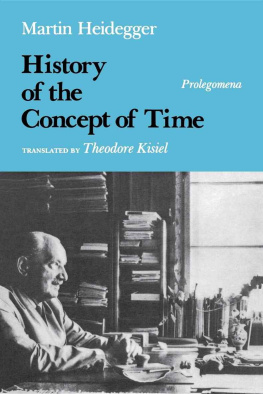
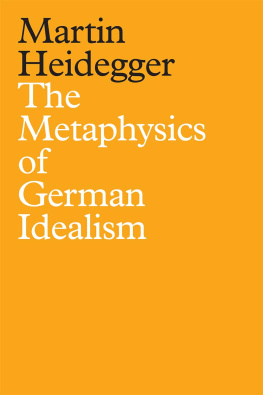

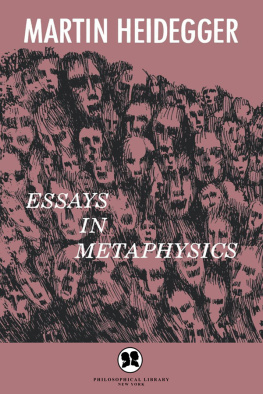
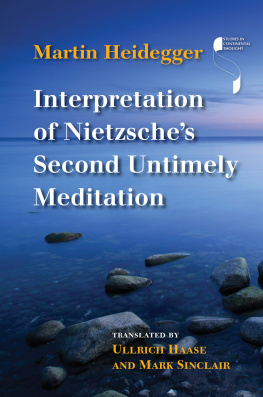
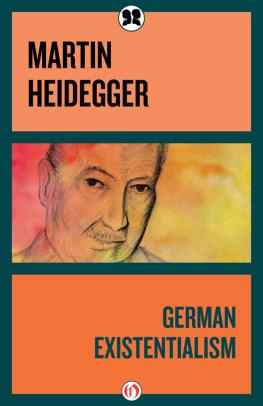

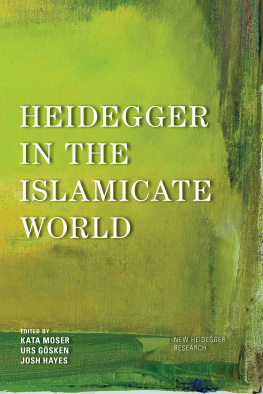
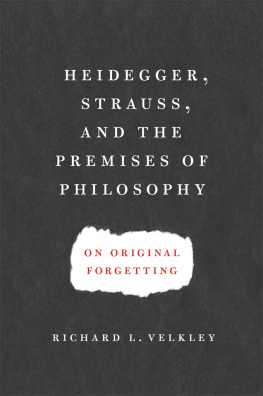
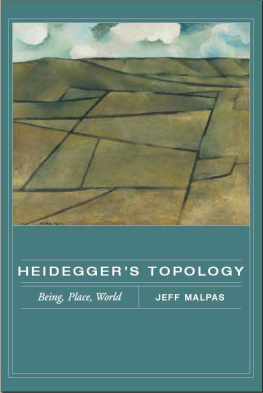
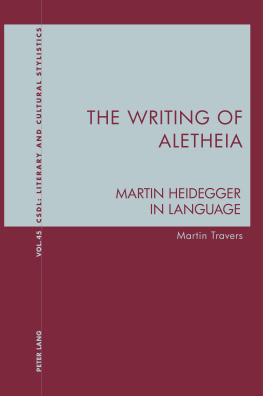

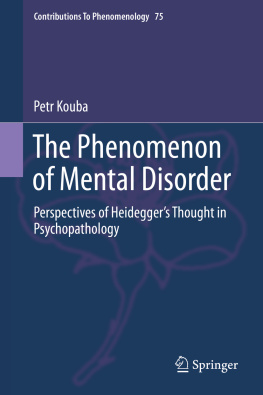


 The paper used in this publication meets the minimum requirements
The paper used in this publication meets the minimum requirements . Heidegger later appended a brief preface to this piece, The Provenance of Thinking, and both of these texts are supplied as appendices below. The former is the only manuscript from Heideggers hand that we have from these seminars (indeed from any of the seminars published during Heideggers lifetime), and thus a key document for illuminating Heideggers seminar work method. It is worth comparing this text with the protocol from that last session for an insight into the functioning of the group and the process of transcription. By no means can we say that the seminar protocol bastardize the pristine thought of the singly composed text. Quite to the contrary, they develop it, comment upon it, and take it in various invigorating directions. Heidegger in conversation is no less a thinker than Heidegger at the
. Heidegger later appended a brief preface to this piece, The Provenance of Thinking, and both of these texts are supplied as appendices below. The former is the only manuscript from Heideggers hand that we have from these seminars (indeed from any of the seminars published during Heideggers lifetime), and thus a key document for illuminating Heideggers seminar work method. It is worth comparing this text with the protocol from that last session for an insight into the functioning of the group and the process of transcription. By no means can we say that the seminar protocol bastardize the pristine thought of the singly composed text. Quite to the contrary, they develop it, comment upon it, and take it in various invigorating directions. Heidegger in conversation is no less a thinker than Heidegger at the